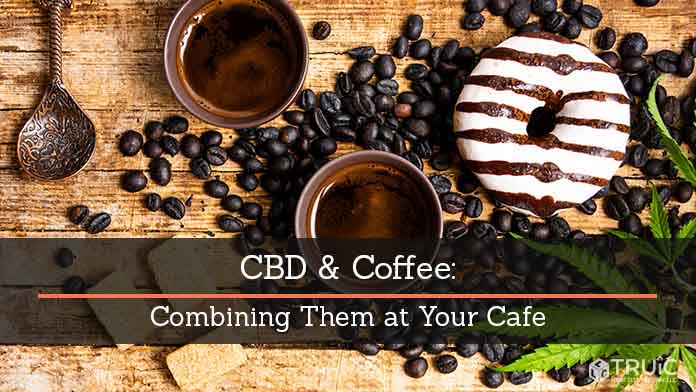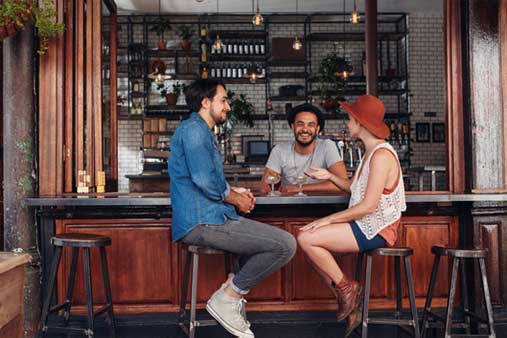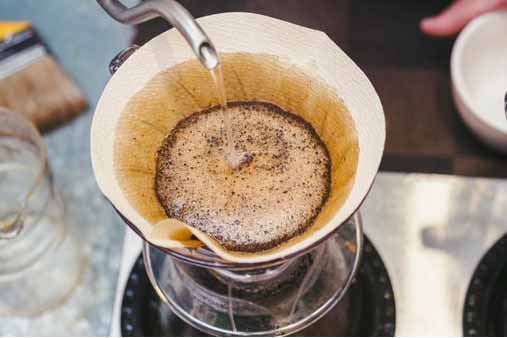CBD and Coffee: Combining Them at Your Cafe
The evolution of cannabidiol (CBD) in American culture accelerated after Congress passed the 2018 Farm Bill. Experts now expect this $390 million industry to grow into the billions within a few years.
Unsurprisingly, other industries want to cash in on this new market — including the coffee industry. From CBD-infused lattes to whole beans, the possibilities of CBD additions to coffee seem endless. However, the legality of this new additive remains questionable.
Recommended: Read our full, in-depth How to Start a Coffee Shop Business guides, inspired by coffee professionals, they will help make your coffee dreams real, from sourcing beans to hiring baristas, forming an actual company, getting a POS System, and everything in between.
Here’s what you need to know about serving CBD in your coffee shop:

What is CBD?
CBD is a compound found in the cannabis plant. It differs from tetrahydrocannabinol (THC) — the compound in marijuana that makes a user feel “high” — because it comes from the hemp plant called cannabis sativa that produces a THC content of less than 0.3%.
While unproven, some people believe CBD causes feelings of relaxation or calmness. The Food and Drug Administration (FDA), which regulates CBD, disagrees with such claims. However, the FDA has yet to gather enough data to accurately determine the substance’s actual impact on humans.
Recommended: Are you interested in a CBD oil business? Check out our general How to Start a CBD Oil Buisiness guide.
Why Serve CBD?
Specialty coffee shop menus commonly feature a variety of add-ons, such as flavored syrups and alternative kinds of milk. Not only do these add-ons help diversify a menu, but they also create a more profitable beverage. In the case of CBD, this additive can double a drink’s profitability.
Serving CBD oil, sometimes called hemp extract oil, also can lure curious customers into your shop to try a new, exciting product in a familiar format — their morning cup of coffee. Depending on your location, offering CBD-infused beverages can help differentiate your coffee shop from the competition.
How do You Serve CBD with Coffee?
The most common way to add CBD to coffee beverages is to use CBD oil. The oil easily blends with other liquids, such as coffee. The method of pairing CBD oil with another oil like coconut oil also helps to mask much of the hemp oil’s earthy flavor profile. Another popular option is to use a CBD oil flavored or combined with a common type of syrup, such as chocolate, already used in some coffee beverages.
How Much Should You Charge?
A typical price point for adding CBD to a coffee beverage ranges from $4 to $5. In most areas, that doubles the cost of the beverage. A best practice for pricing your CBD add-ons is to multiply the price you paid for the CBD product by 2.5.
The Legality of CBD
The passage of the 2018 Farm Bill legalized CBD, or hemp extract oil, in the United States and differentiated it from marijuana. Since then, the rules about how to serve and describe this product remain in flux. This is largely due to the regulation of the substance by the FDA, which continues to research and collect data about the hazards and benefits of CBD.
Until it can establish the positive and negative effects of this substance, the FDA considers it illegal to add CBD to food products. However, not all state governments agree and enforce this position. Before serving or selling CBD products in your business, be sure to contact your local law enforcement agency. They can give you information specific to your area and guide you through the process to ensure you sell CBD properly — if you opt to do so.
State-Specific Regulations
Depending on the state in which you operate, CBD-related laws and enforcement of those laws may differ slightly. Here are a few examples of regulations specific to individual states:
- Some states, such as Oregon and Colorado, permit the addition of CBD to food products while New York, Maine, and California currently uphold the FDA’s ban on CBD additives in food.
- In California, some local health departments will lower a business’ health score if it serves CBD products in its food.
- Other states, such as Ohio, still consider hemp products the same as marijuana and therefore only allow the purchase of such products with a doctor’s permission. That eliminates any possibility of serving CBD-infused beverages or food in a local business.
Marketing and Labeling Restrictions
Because the FDA still lacks concrete data on CBD’s benefits and hazards, it remains illegal to claim any CBD health benefits without a disclaimer that the FDA has not evaluated that product. For more information about labeling CBD products, click here. You also should follow these best practices when selling CBD products in your coffee shop:
- Never market a CBD add-on as having medicinal properties or as a substitute for medication.
- While there’s technically no law against selling CBD products to minors, check with your local law enforcement agency to ensure your shop complies with all local regulations.
- While your state may permit the sale of CBD, it also may have restrictions on adding it to food. Check with your local law enforcement agency before marketing CBD as an addition to any of your recipes.
- You must purchase CBD products from a licensed producer with labeling that explicitly states the producer derives its CBD from hemp plants, not cannabis.
Wrapping Up
Serving CBD oil in your coffee shop is a great way to give your customers a new, exciting coffee experience while boosting profits. However, be sure to contact your local law enforcement agency for guidance on state-specific regulations and follow FDA guidelines to ensure you serve your community responsibly.

